Transcript
BROOKE GLADSTONE:
The U.S. military is shaped by its soldiers, its officers, its missions - and its manuals. There are currently 542 Army field manuals. Chief among them is FM 3-0, called Operations, which lays out the fundamentals of war fighting for future and current generations of recruits.
FM 3-0, due out in October, is getting its first update in six years, including some new priorities in the fight against insurgents. Near the top, influencing civilian populations so they'll help in the effort.
The lead writer of the updated FM 3-0 is 25-year Army veteran, now civilian, Michael Burke, who told us what's new from his cubicle in Fort Leavenworth, Kansas.
MICHAEL BURKE:
Well, the key change we're making in this manual is emphasizing that the way we deal with the civilian population is equally important with the way we attack or defend against an enemy force. That's a key change in the way we've perceived our doctrine in the past. Unfortunately, in some cases, we've focused very strongly on the attack and defense against an enemy and perhaps not emphasized the civilian interaction as much as we are in this manual.
BROOKE GLADSTONE:
Do you think it's possible to get the message across to influence people, given the hits that the Army's image has taken with, you know, Abu Ghraib, with mounting civilian deaths, Guantanamo? Can this manual do anything to alleviate those public image disasters?
MICHAEL BURKE:
I don't know that the manual can directly alleviate what's already happened, but what the manual does do is urge, in some cases, returning back to basics, which is what the leadership has to understand is the role of things like the law of war, the Geneva Conventions and Army regulations for the conduct of soldiers.
But it also stresses the fact that you can't look at war, particularly land operations within war, you can't look at it as solely an exercise in military power directed against other military power. It's really about changing the environment in which you're ordered to operate.
If we don't do that right, if we don't establish the initial conditions properly, then we're already behind the power curve. We've already created an atmosphere that it may be impossible for the other instruments of national power - besides military, we have informational, diplomatic and economic instruments - for those to succeed.
BROOKE GLADSTONE:
Do you have any reason to believe that the leadership is even going to crack this manual?
MICHAEL BURKE:
Well, the Army leadership will. I have no doubt. The real impact of this type of manual is in the way it's absorbed within the education buildings of the Army. For example, right here at Fort Leavenworth we have the brand-new staff college building, and within it, you know, some 1,500 majors, really the heart of the Army's leadership, are going to be, you know, exposed to it in some depth. And they're going to weigh it against their own experiences and what they think is right.
And whether they necessarily accept everything in it or not, it also provides a common language and basis from which all of our soldiers can make judgment calls as to whether they're going to do it the way the manual urges them to do it or to consciously do something different.
BROOKE GLADSTONE:
So what made the Army wait until October of this year to finally bring this out?
MICHAEL BURKE:
Well, I don't think that waiting is the right answer. The question is of evolving from what was into what's going to come. A lot of these ideas were initially offered in the 2001 manual, which was quite a dramatic shift from where we'd been in terms of the Cold War and so forth.
And what we had to do, then, was decide how those things that were in the 2001 manual, plus our operational experiences since 2001, how those added up to the way the Army should think about operations. If we're successful with this, this should inform the Army how to think, but it can't tell the soldier what to do.
Hopefully, by shaping the way they think about operations, we provided them the ability to respond flexibly and, more often than not, correctly to the situation.
BROOKE GLADSTONE:
Thanks very much.
MICHAEL BURKE:
Well, thank you for talking with me.
BROOKE GLADSTONE:
Michael Burke is the lead author of the new Army Field Manual 3-0.


